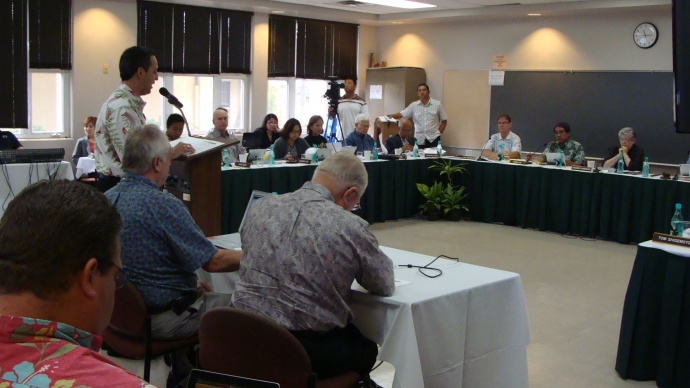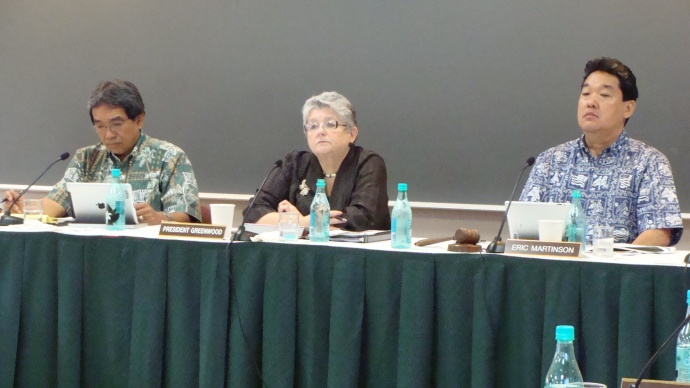Report on Failed Concert Presented to UH Board on Maui

The University of Hawai‘i Board of Regents accepted the report of the Operational and Financial Controls Improvement Advisory Task Group at its monthly meeting held today at the University of Hawai‘i Maui College. Photo by Wendy Osher.
By Wendy Osher
A University of Hawai’i Advisory Task Group released a report today with findings and recommendations following a failed Stevie Wonder concert fundraiser, that has become known in public circles as the “Wonder Blunder.”
The University of Hawai‘i Board of Regents accepted the report at its monthly meeting, held at the UH Maui College campus in Kahului.
The nine-member Operational and Financial Controls Improvement Advisory Task Group was created in August and was tasked with examining what happened during the preparations for the concert that lead to the loss of the university’s $200,000. The group also looked into policies and procedures that might need to be changed so that similar events would not occur in the future.
Task force members said the failure to obtain cancellation insurance was the responsibility of the UH Athletic Director and the manager of the Stan Sheriff Center. The approval to dispense funds, they said, was the responsibility of the manager of the Stan Sheriff Center, the associate director for administration, and the associate director for system operations. However, task force members said the individuals were responsible for making sure they had the proper sign-offs, which were accounted for.
The groups findings and observations are as follows:
- There are insufficient policies and procedures relating to ticket refunds: Through our review of the policies and procedures listed above, we noted that there is insufficient guidance with respect to event cancellations and ticket refunds. While existing procedures describe how ticket sales are voided and credit card ‘charge-backs’ are processed, they do not set forth any policies that specify the circumstances in which ticket refunds will be made by the university and the authorizations that are necessary. Additionally, there are no policies or procedures governing the refund of ticket sales that are held in an agency (custodial) account on the behalf of others. Such policies and procedures would provide guidance on approvals necessary to process the refunds and how a shortfall in the agency (custodial) account would be resolved (e.g., by additional funds from the other party, refunds on first come, first served basis, or other).
- Ticket refunds were processed at no additional cost to the Athletic Department: Most of the refunds were accomplished by simply reversing the transactions processed through the internet. In this case, the merchant (credit card) processing fees charged to the Athletics Department by the various credit card companies were also reversed. Refunds to those who purchased their tickets at the Ticket Office were processed during normal business hours and no incremental labor costs were incurred. Merchant card processing fees charged on individual ticket sales at the Ticket Office window were also reversed when the refunds were processed at the Ticket Office.
- Refunds required the university to transfer $200,000 from the Athletics Department: Revolving Fund to restore the amount disbursed from the agency (custodial) account. To ensure sufficient funds were available to cover the $631,449 in refunds, the university transferred $200,000 from the Athletics Department Revolving Fund to the agency (custodial) account to make up for the shortfall created by the disbursement to Epic. This transfer of public funds to the agency (custodial) account was recorded as an expenditure of the Athletics Department. If restoration or recovery is considered probable, it may be appropriate to record this as a receivable from BPE.
The group issued the following recommendations:
- The university should develop and implement policies and procedures related to processing ticket sale refunds. The policies and procedures should address the following: a. Authority over event cancellations and approval of ticket refunds; b. Communication protocols on event cancellations and ticket refunds; c. The circumstances in which refunds are acceptable or allowed; d. Refunds of various ticket processing fees; and e. How refunds will be processed.
- Staff should be provided training on the policies and procedures once they are developed and implemented to ensure roles and responsibilities are clearly understood.
- Since the university’s Athletics Department provided the funds necessary to cover the refund of ticket sales, it should consider and evaluate whether the total direct costs incurred as identified should be recorded as a receivable from BPE.
- The ticket refund policy should be made available on the university’s Ticket Office website.
Board members voted to accept the report at today’s meeting. They said the expect to hear back from UH administration on how they will implement the recommendations made.











